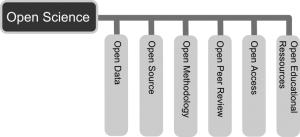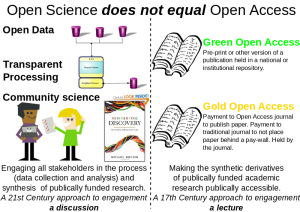 Open science is the movement to make scientific research, data and dissemination accessible to all levels of an inquiring society, amateur or professional. It incorporates open access publishing as a key principle, alongside open data, open source, open methodology, open peer review and open educational resources. Examples of movements within open science include citizen science (whereby research is conducted, in whole or in part, by amateur or nonprofessional scientists) and open data (data should be freely available to everyone to use and republish as they wish, without restrictions from copyright, patents or other mechanisms of control). There is an excellent introduction to open science available here: what, exactly, is open science?
Open science is the movement to make scientific research, data and dissemination accessible to all levels of an inquiring society, amateur or professional. It incorporates open access publishing as a key principle, alongside open data, open source, open methodology, open peer review and open educational resources. Examples of movements within open science include citizen science (whereby research is conducted, in whole or in part, by amateur or nonprofessional scientists) and open data (data should be freely available to everyone to use and republish as they wish, without restrictions from copyright, patents or other mechanisms of control). There is an excellent introduction to open science available here: what, exactly, is open science?
 The open science movement is gaining momentum. Some research funders, such as the UK Research Councils and European Commission for example, now have mandates in place to enforce open access publishing and open data sharing as a requirement of receiving their funding. The RCUK public engagement strategy states the UK Research Councils will support collaborative and co-produced research (e.g. citizen science, community engagement and social participation) and the councils have funded a number of open science research projects, for example, EPSRC funded UCL’s ‘Extreme’ Citizen Science (ExCiteS) project and AHRC funded Oxford’s Constructing Scientific Communities: Citizen Science in the 19th and 20th Centuries.
The open science movement is gaining momentum. Some research funders, such as the UK Research Councils and European Commission for example, now have mandates in place to enforce open access publishing and open data sharing as a requirement of receiving their funding. The RCUK public engagement strategy states the UK Research Councils will support collaborative and co-produced research (e.g. citizen science, community engagement and social participation) and the councils have funded a number of open science research projects, for example, EPSRC funded UCL’s ‘Extreme’ Citizen Science (ExCiteS) project and AHRC funded Oxford’s Constructing Scientific Communities: Citizen Science in the 19th and 20th Centuries.
 The European-funded project FOSTER (Facilitate Open Science Training for European Research) aims to establish mechanisms for researchers to embed open sciences in their daily workflow, thus supporting them to optimize their research visibility and impact. The project has created an excellent resource bank that provides a general introduction to the various components and philosophies of open science including why open science is essential to rigorous, reproducible and transparent research, as well as to future research evaluation criteria focused on societal impact.
The European-funded project FOSTER (Facilitate Open Science Training for European Research) aims to establish mechanisms for researchers to embed open sciences in their daily workflow, thus supporting them to optimize their research visibility and impact. The project has created an excellent resource bank that provides a general introduction to the various components and philosophies of open science including why open science is essential to rigorous, reproducible and transparent research, as well as to future research evaluation criteria focused on societal impact.The Open Science Federation website is an excellent source of information and inspiring ideas of how to embed open science into your research. There is an open science Twitter account if you want to keep up to date with open science information from around the world – @openscience.
If you are interested in building open science principles into your next research project, then speak with your Research Facilitator.











 New CMWH paper on maternity care
New CMWH paper on maternity care From Sustainable Research to Sustainable Research Lives: Reflections from the SPROUT Network Event
From Sustainable Research to Sustainable Research Lives: Reflections from the SPROUT Network Event REF Code of Practice consultation is open!
REF Code of Practice consultation is open! ECR Funding Open Call: Research Culture & Community Grant – Apply now
ECR Funding Open Call: Research Culture & Community Grant – Apply now ECR Funding Open Call: Research Culture & Community Grant – Application Deadline Friday 12 December
ECR Funding Open Call: Research Culture & Community Grant – Application Deadline Friday 12 December MSCA Postdoctoral Fellowships 2025 Call
MSCA Postdoctoral Fellowships 2025 Call ERC Advanced Grant 2025 Webinar
ERC Advanced Grant 2025 Webinar Update on UKRO services
Update on UKRO services European research project exploring use of ‘virtual twins’ to better manage metabolic associated fatty liver disease
European research project exploring use of ‘virtual twins’ to better manage metabolic associated fatty liver disease